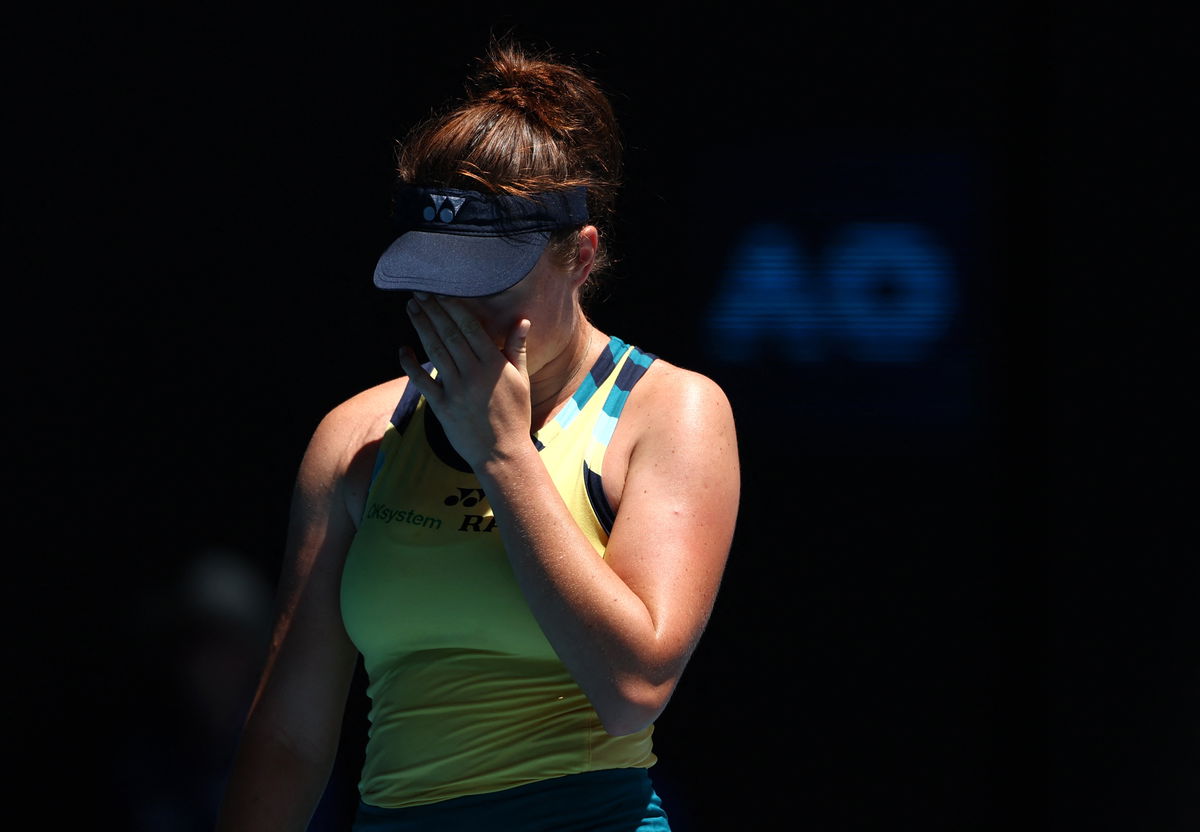
Reuters
Tennis – Australian Open – Melbourne Park, Melbourne, Australia – January 24, 2024 Czech Republic’s Linda Noskova reacts during her quarter final match against Ukraine’s Dayana Yastremska REUTERS/Eloisa Lopez

Reuters
Tennis – Australian Open – Melbourne Park, Melbourne, Australia – January 24, 2024 Czech Republic’s Linda Noskova reacts during her quarter final match against Ukraine’s Dayana Yastremska REUTERS/Eloisa Lopez

Reuters
Tennis – Australian Open – Melbourne Park, Melbourne, Australia – January 24, 2024 Czech Republic’s Linda Noskova reacts during her quarter final match against Ukraine’s Dayana Yastremska REUTERS/Eloisa Lopez

Reuters
Tennis – Australian Open – Melbourne Park, Melbourne, Australia – January 24, 2024 Czech Republic’s Linda Noskova reacts during her quarter final match against Ukraine’s Dayana Yastremska REUTERS/Eloisa Lopez
Coco Gauff was flooded with abuse when she dominated Tatjana Maria in the 2024 US Open’s second round. Daria Kasatkina received death threats after beating Magda Linette at the WTA Elite Trophy. And Jessica Pegula? She had no choice but to come to terms with “constant death threats” and “family threats” as something “normal now.” For WTA stars, these aren’t just side effects of fame. It’s impacting their mental health now.
Watch What’s Trending Now!
Caroline Garcia shared a similar frustration last August, where she pleaded with her fans to remember that players “are human.” Yet, despite the warnings, hateful messages towards players on social media have intensified even more. Now, another player has joined this grim ordeal, she is Linda Noskova. Despite her bitter experiences with online trolls, however, Noskova refuses to be shaken by the hate.
The Czech star lost the 2025 Abu Dhabi Open semifinals to her American opponent Ashlyn Krueger by 6(2)-7(7) and 4-6. Despite impressive performances against highly skilled players like Paula Badosa and Magda Linette, Noskova couldn’t get past Krueger in the semifinals. While she was left disappointed by the loss, what followed after the match was even more devastating. After her elimination from the WTA 500 event, Noskova received a series of hate messages on her Instagram DM.
Noskova was called names and derogatory ones at that. However, hateful messages couldn’t diminish her spirit. Instead of heartbreak, she shared a reel compiling those messages and remarked: “Should I make this a tradition?” Noskova added a laughing and a kissing emoji to her caption as well.
Linda Noskova shares a barrage of hateful messages she received after her loss to Ashlyn Krueger in Abu Dhabi.
These messages are downright pathetic.
This is so not okay. pic.twitter.com/2jxCO1qvlt
— The Tennis Letter (@TheTennisLetter) February 7, 2025
The Czech player’s carefree attitude towards haters stemmed from her previous experience. Last year in Abu Dhabi, she lost the opening round match to Spain’s Sara Sorribes Torino and fell victim to the public’s wrath. She made a video compiling all the hateful messages and posted it on her social media at that time as well and received the fraternity’s support.
Although Noskova is trying to keep her head held high despite dealing with the trolls, her encounter with haters highlights the struggles of those athletes, who face unacceptable behavior despite giving their best every match. Last year, the ITF (International Tennis Federation) partnered with WTA and other organizations to study social media abuse on players. And, the results were quite shocking!
Threat Matrix: A new step to put an end to social media hate?
Last year the ITF, WTA, All England Lawn Tennis Club, and USTA collaborated to launch an artificial intelligence-led detection system program for monitoring posts on social media platforms like X, Instagram, TikTok, Facebook, and YouTube. According to the research, angry gamblers were deemed 48% responsible for 12000 abusive social media posts directed towards tennis players.
From January 2024 to October, the “Threat Matrix” monitored 2.47m posts, among which 12000 posts and comments broke the social media platform’s community guidelines. Threat Matrix identified 15 abusive social media accounts and passed them to National Law Enforcement for action. 26 accounts, that were sources of prolific abuse, were suspended. The system worked with 39 languages and protected 7739 ITF World Tennis Tournament participants with 563 WTA tournament participants.
Jonathan Hirshler, CEO of Signify Group for Threat Matrix, said, “We are extremely pleased to have helped close down a considerable number of prolific abusive accounts and identified clear drivers for abuse, including a large number of angry gamblers.”
Many players welcomed the system including WTA Players’ Council member Victoria Azarenka who believed it would “create a healthier online environment.” The Belarusian added, “It was essential for the WTA and these partner organizations to take meaningful steps toward filtering, blocking, and reporting hateful and harmful comments.”
Threat Matrix identified potential hate accounts and helped close them for tennis players’ mental health. For 2025, they have offered their ideals: “As we enter 2025, the Threat Matrix initiative will be further enhanced to include support with direct messaging abuse protection for those who need it. We are realistic about the battle we face but are resolute in doing whatever we can to protect our athletes, their mental health, and overall well-being from online abuse.” Do you think this initiative will protect more and more players going forward? Share your thoughts in the comments below.


